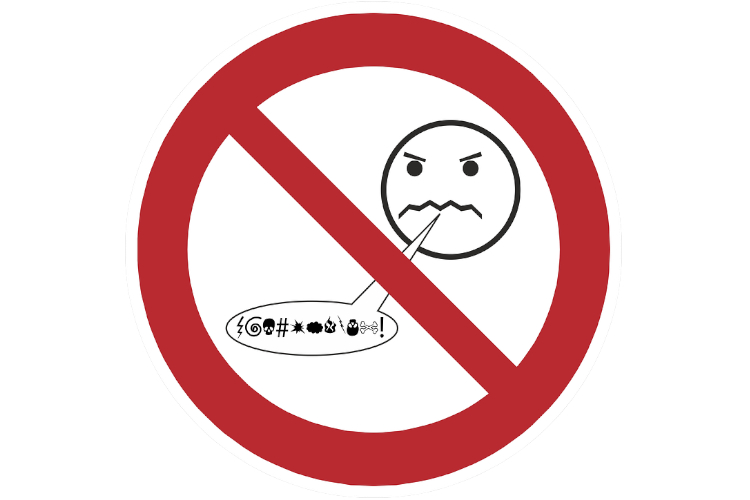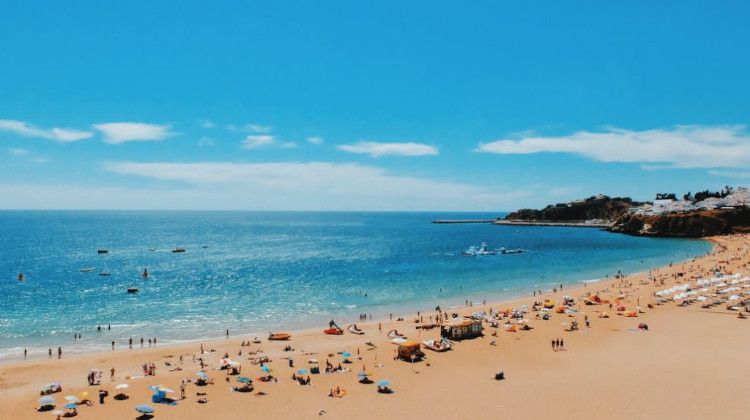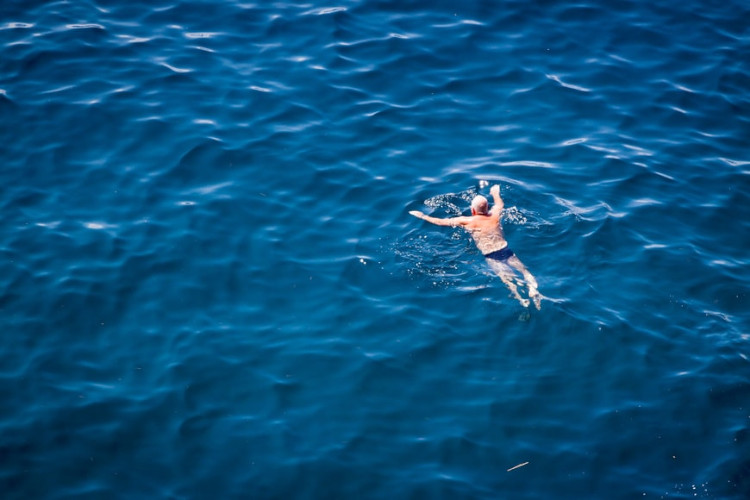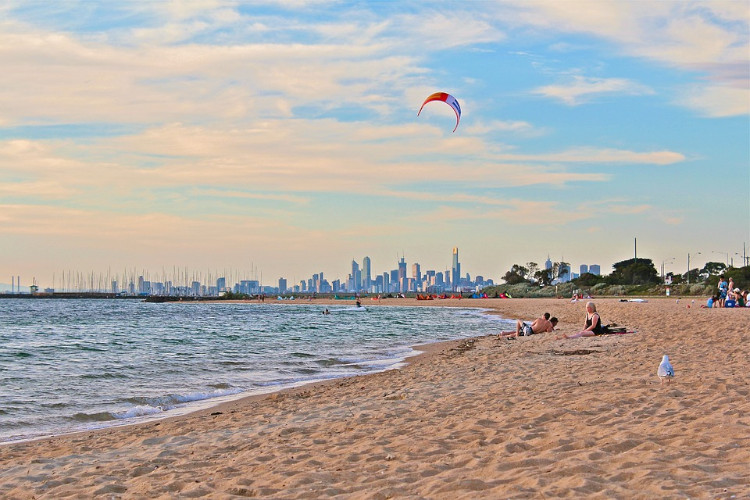
Wherever there is society, laws are required to govern what citizens may or may not do. While most laws make sense and are put in place to protect and direct the people that fall under its jurisdiction; some laws are so strange that they may make no sense to people who have been living freely without them. Other laws are also informed by cultural or religious values that may seem foreign to those of a different background, and unknowingly violating them may be seen as disrespectful.
In this article we’ll take a look at 17 unusual, weird or downright ridiculous laws that make no sense; or laws that are based on cultural values that most Westerners may not be accustomed to. Some of these laws may simply be outdated, others downright incredulous; either way, we’re sure some of them will make you chuckle.
Let’s start with one that is more unusual than weird.
1. It is against the law to swear or utter profanities in public in the UAE

According to Article 373 of the UAE Penal Code, swearing and profanity “disgraces the honor or the modesty of a person”. As a result, dropping an F-bomb in public could land you up to a year in prison, or set you back up to 10 000 Dirham in fines. Giving someone the finger is even worse and could get you deported. Thanks to rather stringent cyber-crime laws, swearing and using profane emojis on social media or chat apps may also land you in hot water. If you frequently need some soap for your mouth, it’s best to be extra vigilant in the UAE and rather learn to express yourself with a more nuanced vocabulary.
2. In Thailand, it’s illegal to drive without a shirt on

While this law isn’t really enforced in island destinations like Phuket, it is illegal to drive without a shirt on in Thailand. This counts whether you’re driving a scooter, a bike, a car or taking public transport. It is also a big no-no to go commando in public. Luckily there aren’t spot checks to ensure everyone is wearing their underwear, but just be sure not to get caught in a rain storm wearing only white…
3. It is illegal to walk around shirtless/topless in Barcelona

While on the shirtless topic; it is also illegal to walk around shirtless in Barcelona, of all places! Reportedly, Spanish law in general actually does NOT prohibit taking off one’s shirt in public (or public nudity in general, for that matter); however, regional laws have been put in place in destinations like Barcelona to prevent beach-goers from walking around the rest of the city in bikinis or speedos. Obviously this rule does not apply on the beach and main beachfront promenades, but traversing the ever-popular Las Ramblas with a bare torso could land tourists in hot water and earn them a fine ranging from 120 to 500 euros. Better slap on that shirt before visiting Park Güell!
4. Chewing gum is [mostly] banned in Singapore

Back in 1992, after vandals made a habit of sticking chewing gum on train door sensors, and after the city spent S$150 000 annually to clean up disgusting gum stains from public areas, the government of Singapore introduced controversial regulations which banned all forms of chewing gum. People caught with the sticky stuff could receive a hefty fine, while vendors caught importing, manufacturing or selling gum could even receive jail time. In March 2004, however, Singapore signed a free-trade agreement with the United States which led to the ban being partially lifted; though mostly for prescribed or ‘therapeutic’ forms of gum, such as nicotine or dental gum. Visitors need not fret, though, as some places lately do sell gum, and it’s not illegal to bring small amounts of gum for personal use – just don’t sell it and be sure to dispose of it properly after use. Also be cognisant of the fact that it may be seen as rude when speaking to locals while chewing.
5. High heels are banned from the Acropolis in Athens

In fact, it’s not just at the Acropolis, but also at many of the most popular ancient Greek sights. Not only is it rather impractical to try and don ancient ruins in stilettos, but officials have noticed it contributes to the erosion of the millennia-old marble, causing irreparable damage to some of the most prized historical treasures in history. In many cases, eating and drinking (including our old familiar culprit – chewing gum) is also prohibited.
6. Wearing camo clothing is prohibited in many Caribbean nations

Not that anyone would wear an army jacket on a Caribbean beach, but it might be better to leave your camo-print swimwear at home on your next trip to Barbados, Trinidad and Tobago, St Kitts and Nevis or Antigua and Barbuda. While most visitors aren’t bothered when caught in camouflage (that is, if they are spotted…), offenders may face a fine and have the items in question confiscated. There is some debate as to whether it is actually a legislated law in any of these countries, but most of their tourism authorities do request that visitors steer clear of camo-print clothing; so it’s best to be a polite traveller and respect their requests.
7. Legally you can’t pay with too many coins in Canada

Whether a resident or a tourist, no one likes walking around with a large amount of coins. The easy solution is normally just to tally them and go pay for something at a local shop or vendor. In Canada, however, you could end up having a bit of a hard time doing so, because the nation’s Currency Act dictates the maximum amount of coins that can be used to pay for goods or services, depending on the denomination of the coin. In effect, then, residents (and visitors) legally can’t pay more than:
- $40 in $2 coins (actually through to $10 coins, though the $2 coin is the highest denomination in circulation today)
- $25 in $1 coins
- $10 in coins ranging from 10 cents to a dollar (so 10, 20 and 50 cent coins)
- $5 in 5 cent coins
- 25c in 1 cent coins (though 1 cents do not have to be accepted by vendors since it is no longer minted)
The same act also stipulates that any amount payable from one person to another on the same day is considered one transaction. That means you can’t cash in your $30 in $1 coins in two transactions at the same vendor in the same day – though you could just go to more than one shop.
8. It’s [supposedly] illegal to urinate in the ocean in Portugal

We say supposedly because, although it has been reported in official news sources, we couldn’t find a government website or agency publication that confirms this as law. There is also no mention of whether this means while submerged in the water, or standing on a sandy beach. Then there’s also the question of how anyone will know or enforce a penalty… Nonetheless, before going to the beach in Portugal, it may be best to ensure you go before you go, you know?
9. In England and Wales it’s an offense to handle salmon suspiciously

Yes, you read that right: According to the UK’s Salmon Act of 1986, it’s an offense to handle salmon “in suspicious circumstances”. This ruling also applies to trout, eels, lampreys, smelt and many more; and offenders may face a hefty fine, or, according to some sources, up to two years jail time! So, what exactly constitutes handling these fish in suspicious circumstances? If you read the full Section 32 of this Act, it soon becomes clear they are referring to contexts where authorities may be led to reasonably believe that the fish were illegally caught, distributed or disposed of. Some context definitely brings some sense to this law! It’s best to get the proper permits before going on that fishing trip with your mates.
10. Feeding the pigeons in Venice is strictly prohibited

The infamous pigeons that gather around St Mark’s Square in Venice has long attracted tourists, who in turn used to buy grains or seeds from vendors on the square to feed them. However, since 2008, the sale of any pigeon feed has been banned in the city, and fines for ignoring the ban start at 50 euros. The issue is not just the massive amount of droppings left by these big flocks of sky vermin: according to officials, leftover grains and food scraps can easily be blown into small cracks and crevices in the city’s marble statues and buildings, luring the pigeons to peck away and damage these delicate treasures. The bill to clean and repair these buildings and statues reportedly amounted to 275 euros per Venetian taxpayer annually, which left officials with no choice but to try and deter the pigeons.
11. It’s illegal to hike naked in Switzerland

Switzerland is consistently ranked in one of the top three spots in the world when it comes to personal freedom. Perhaps that is why a growing number of hikers had started a trend to enjoy the country’s otherworldly scenery au naturel. That was until one bare hiker in the more conservative Appenzell region passed a family picnic area, prompting local lawmakers to reconsider where to draw the line. You see, while there aren’t laws against moderate public nudity in Switzerland, there are laws against indecency; and in this event lawmakers argued that nude hiking qualified as “a breach of decency customs”. The hiker in question received a fine of 100 Swiss francs, as could any new hikers who get caught appreciating Switzerland’s nature in the nude.
12. Running out of fuel on Germany’s autobahn is against the law

Germany’s famous Autobahn, just like any freeway system, has many rules that help regulate traffic. But with virtually no speed limits on many sections of the Autobahn, there are naturally some additional regulations put in place to help prevent a catastrophic, high-speed collision. One of these stipulates that drivers aren’t allowed to stop, park, make u-turns or back up on the freeway. Therefore it is also illegal to run out of fuel, as it is seen as a completely preventable occurrence that causes drivers to violate the rule of no stopping. Aside from being illegal, it will also be embarrassing to run out of fuel in your luxury German car right after you’ve bolted past other drivers in the slower lanes…
13. In the UAE, public displays of affection are a no-no

Let’s face it, no one would even bat an eyelid at a couple holding hands or kissing in New York or Paris. But the United Arab Emirates, like many other Islamic nations, has stricter values than those we may be accustomed to in more liberal nations in the West. There have been many past incidents where couples were fined, jailed or both for kissing in public. One famous case from 2013 involved two lovebirds that were spotted passionately snogging inside a lifeguard tower on a public beach. They admitted that they had been drinking without a license but denied the kissing, claiming to have been giving and receiving CPR instead. Ultimately, they were sentenced to 12 months in jail and were both fined 1 000 UAE dirham for consuming alcohol in public. Granted, in recent years and especially in cosmopolitan Dubai, it has become a bit more relaxed; but it’s best to be respectful of local customs and err on the side of modesty when visiting the UAE’s desert metropolises.
14. Flip-flops are banned on the Isle of Capri

While we couldn’t find official sources for this one, there are numerous reports online about tourists being warned, or fined, for wearing flip-flops on the beautiful Isle of Capri. It doesn’t end at flip-flops, but also includes any noisy or slippery type of shoe. A similar ruling in the Cinque Terre region could see tourists being fined between 50 and 2500 euros for wearing flip-flops, high heels and other shoes without proper grip. The issue is not just because flip-flops lack any form of fashionable decorum, but also that hikers risk slipping and falling on rocky trails, which in turn leads to expensive medical rescue missions. Realistically, when touring these breathtaking Italian towns, you’re going to walk a lot, so you might as well wear comfortable hiking shoes anyway.
15. Men have to wear Speedo-style swimwear in France

Now, before you go right ahead and cancel that trip to the French Riviera, rest assured: it’s not as bad as it sounds. While the typical, extremely revealing Speedos are definitely commonplace; it is also perfectly fine to wear any trunk or boxer-style swimwear, as long as it is tight-fitting. This custom is normally mostly a requirement at public or hotel pools, since the tighter fit is considered more hygienic. It also prevents people from walking around town in nothing but their dripping swimwear…
16. It is illegal to fly a kite in Victoria, Australia…

…but only if flying the kite to “the annoyance of any person”. This law was introduced in Section 4 of the Summary Offences Act 1966 (Vic), and we can only imagine how the backstory to this legislation may have played off. Should offenders be caught purposely flying their kite in the face of their fellow beachgoers, they stand to face a fine of up to $777.30. Yes, they’ve even calculated it to the cent. Crikey! On the topic of absurd Aussie laws; in Victoria you can also get fined when singing an obscene song or ballad in public, or face up to 10 years imprisonment for doing business with pirates!
17. Water guns are banned during Cambodian New Year

In Cambodia, it is common for revellers to splash each other with water during their three day Khmer New Year celebrations. This gesture is seen as a sign of blessing or of good wishes. However, some even bless random passersby by spraying them with water pistols, leading to traffic accidents and causing public disorder. That is why, in recent years, the sale and use of water guns has been banned during celebrations in many cities, including Siem Reap and Phnom Penh. According to a BBC report, there have also been instances where ill-willed locals filled their water guns with acid to get revenge on their unsuspecting enemies. Not a great way to start a new year!
How many of these facts did you know? How many did you find out for the first time? Leave a comment below, share it with your colleagues and don’t forget to subscribe to our blog for more interesting travel content.

Leave a Reply